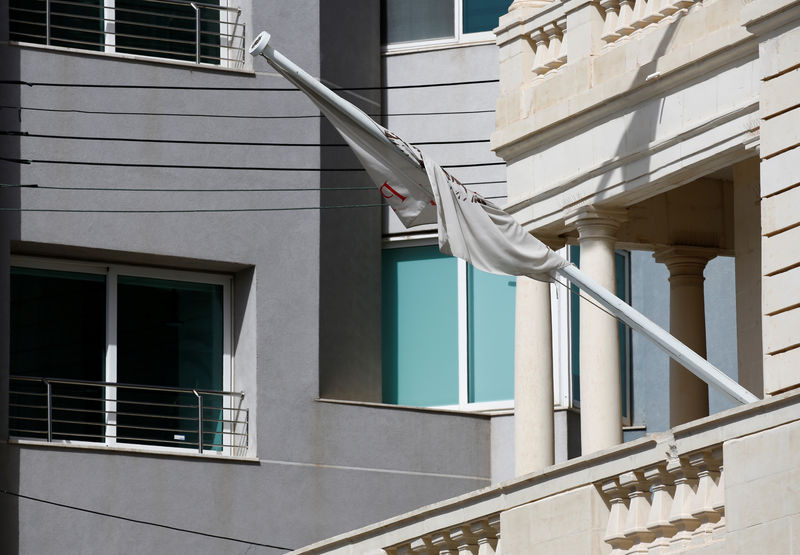 © Reuters. The Maltese-registered Pilatus Bank, is seen at Whitehall Mansions in Ta’ Xbiex
© Reuters. The Maltese-registered Pilatus Bank, is seen at Whitehall Mansions in Ta’ XbiexBy John O’Donnell
FRANKFURT (Reuters) – Lawmakers and campaigners have criticized Malta’s authorities for lax controls of a bank whose Iranian chairman was arrested on U.S. charges of evading sanctions and money laundering.
The critics include the children of an investigative journalist murdered in Malta last year and some lawmakers questioned whether Pilatus Bank, which is registered in Malta, should keep its license.
The bank’s chairman Ali Sadr Hashemi Nejad, 38, was charged in an indictment filed in a federal court in Manhattan accusing him of involvement in a scheme to evade U.S. economic sanctions against Iran, prosecutors have said.
Sadr was arrested on Monday in Dulles, Virginia, according to court papers. A lawyer for Sadr has declined to comment. [L1N1R226Y]
Pilatus Bank, which was not mentioned in the U.S. prosecutor’s statement, did not respond to requests for comment.
The case deals a further blow to Malta’s image, following the murder last October of journalist Daphne Caruana Galizia in a car bomb attack. She had reported widely on corruption and had also accused Pilatus of money laundering.
The arrest and the U.S. charges are also a setback for the European Union’s regulators who have attempted to tighten EU banking controls in recent years, putting the European Central Bank in charge of monitoring big euro zone banks.
The ECB said it was not responsible for Pilatus and declined to comment when asked whether its supervisors had ever discussed the group.
Malta’s financial supervisor announced that Sadr should not continue in his role at the bank and ordered Pilatus not to allow the group’s top management to carry out transactions such as withdrawing money.
The agency also said it was considering other supervisory measures but its response fell short of what lawmakers had called for earlier in the day.
“Don’t keep on washing your hands,” Adrian Delia, the leader of the country’s opposition Nationalist Party, wrote in a message on Twitter, addressed to the country’s prime minister.
“Suspend Pilatus Bank license now.”
David Casa, a Maltese member of the European Parliament said: “It is disgraceful that this bank was ever given a license to operate in Malta.”
Pilatus received its license after the Iranian group at the center of U.S. claims made $115 million of payments now being contested.
In a statement, the sons of murdered journalist Caruana Galizia – Matthew, Andrew and Paul – said: “Malta’s authorities failed to hold Ali Sadr Hashemi Nejad to account, leaving our mother to do so alone.”
They welcomed the U.S. move, saying: “Their action vindicates our mother’s work, but it has come at a terrible cost. One of our mother’s sources … now sits in an Athens prison cell, and our mother is dead.”
‘TARNISHED’ NAME
The European Commission, the EU’s executive arm, said earlier this week it had been monitoring the situation on the Mediterranean island – before the arrest of the bank executive.
“At this stage there are no grounds for sanctions but we keep looking into the issue and if at some stage … there would be grounds for sanctions we would not hesitate to propose those sanctions,” its First Vice President Frans Timmermans told journalists on Tuesday.
“We do everything we can so that this horrible murder and those responsible … are brought to justice.”
The events unfolded after a former employee of Pilatus, who ignited a political scandal in Malta after she became a source for the murdered journalist, surrendered to Greek police. [L8N1R22XO]
Maltese prosecutors have filed a European warrant for the arrest of Maria Efimova, a Russian who left Malta for Greece last year with her family, on suspicion of embezzlement. A Greek police official said she had been arrested at Malta’s request.
Efimova was employed for three months in 2016 by Pilatus. Galizia named her as the source of internal bank documents which she said indicated that Michelle Muscat, wife of Prime Minister Joseph Muscat, owned a secret company in Panama.
Joseph Muscat and his wife have denied the accusations.
Emanuel Delia of the Civil Society Network told a news conference outside Pilatus Bank on Wednesday: “Malta’s good name has … been seriously tarnished across the world.”
Pilatus was in litigation with Galizia over articles she wrote accusing the bank and Ali Sadr of facilitating corrupt political activities and money laundering. The bank said the articles were false and defamatory.
Source: Investing.com




























